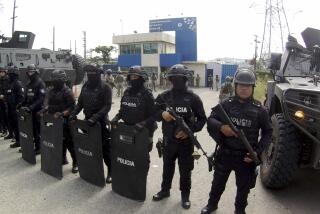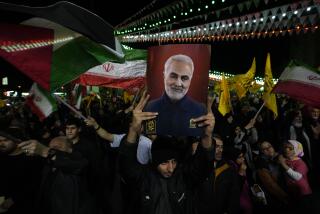U.S. closes consulate in Lahore, Pakistan, citing a specific threat
- Share via
ISLAMABAD, Pakistan — The American Consulate in Pakistan’s second-largest city was closed and its employees evacuated, a U.S. State Department spokeswoman said Friday, in response to a specific threat and in line with a broader warning that Americans should avoid traveling to Pakistan.
Spokeswoman Meghan Gregonis did not disclose details of the threat, which she said was specific to Lahore. It wasn’t immediately clear whether the danger was linked to an advisory this week about a possible Al Qaeda attack that prompted Washington to temporarily close more than 20 diplomatic missions in Africa, the Middle East and South Asia.
Pakistani analysts said that the move could further erode the country’s battered reputation abroad, but that they weren’t surprised the Americans closed the consulate given the number of attacks nationwide in recent weeks as insurgents try to intimidate the new Pakistani government.
Nonessential U.S. foreign staff members in the eastern city were moved to Islamabad as a precaution.
The U.S. will continue to monitor intelligence reporting, Gregonis said, and it was not known when the consulate would reopen. It had already been scheduled to be closed Thursday through Sunday for the Muslim holiday Eid al-Fitr. Gregonis declined to say how many staff members were affected, citing security reasons.
A State Department travel warning issued Thursday said the presence of foreign and indigenous terrorist groups poses a danger to U.S. citizens throughout Pakistan.
Members of the Lahore business community said the U.S. move was unwelcome, if understandable.
“This will affect the economy, stock exchange, remittances and further devalue the rupee,” said Mian Abuzar Shad, vice president of the Lahore Chamber of Commerce and Industry. “The U.S. has every right to protect its diplomatic staff. We are a peace-loving nation. Any threat or attack on U.S. citizens in Pakistan will earn us a very bad reputation.”
Shad also said the U.S. had contributed to Pakistan’s plight by supporting past dictators and launching drone attacks, reaping short-term benefits while undermining Pakistan’s democracy, rule of law and the economy.
In recent weeks, Pakistan has issued its own warnings and stepped up security in the capital, Islamabad, and elsewhere.
“The government of Pakistan has itself issued a red alert for the entire country,” said Nasim Zehra, an Islamabad-based analyst. “There have been 56 bomb blasts and hundreds of threats in the last 60 days.”
The spate of attacks has angered and unnerved Pakistanis long inured to danger.
“The government has totally failed to provide security for the citizens,” said Mohammad Asad, a university student in Islamabad. “Police can’t protect themselves. How will they protect us?”
On Friday, gunmen killed at least 10 people and wounded 30 in Quetta, capital of the southern province of Baluchistan, in the second attack there in two days, local news reports said. The apparent target was Ali Madad Jatak, a former provincial minister, who was emerging from prayers at the Jamia Farooqia mosque. He escaped unharmed.
Television video showed blood on the stairs leading to the mosque as crime investigators searched for evidence and a young man placing the body of an elderly relative in a vehicle. No group had taken responsibility.
The attack followed a suicide bombing by the Pakistani Taliban on Thursday that left 30 people dead at a police funeral in Quetta, a hub for Islamic militants and sectarian and separatist insurgents.
Analysts said they believed the recent increase in attacks reflected attempts by militants to prevent the government from adopting a concerted strategy against extremism. Militants are also angry that four condemned prisoners are to be hanged this month, analysts said, including two members of the banned sectarian group Lashkar-e-Jhangvi. The announcement on the executions came after a five-year moratorium.
“Over the last few months, these attacks seem to be well-coordinated,” said Zahid Hussain, an Islamabad-based security analyst.
The government of Prime Minister Nawaz Sharif was elected in May on a pledge to fight terrorism but has so far failed to act on it.
Late Thursday, however, after the Quetta suicide bombing, Sharif ordered the Interior Ministry to present a counter-terrorism strategy by Tuesday.
“I think he’s realized enough is enough,” analyst Zehra said. “They haven’t been on a war footing or been proactive. Up to this point, there’s only been an ad hoc response to the increased threats, deaths and bomb blasts.”
Analysts said that all too often in the absence of a concerted approach, Pakistani police have been left to fight militancy on their own.
“Police remain the unsung heroes,” Zehra said. “Some have been killed, their houses bombed, their spine crippled. The big question is when the army’s going to get more involved.”
Adding to regional jitters, India’s capital, New Delhi, was placed on high alert Friday after police received intelligence that Pakistani cleric Hafiz Muhammad Saeed, reputed mastermind of the 2008 Mumbai killings of 166 people, was planning an attack on the Red Fort, one of the capital’s most famous monuments, local news reports said, citing security sources.
Special correspondent Khan reported from Islamabad and Times staff writer Magnier from New Delhi.
More to Read
Sign up for Essential California
The most important California stories and recommendations in your inbox every morning.
You may occasionally receive promotional content from the Los Angeles Times.













